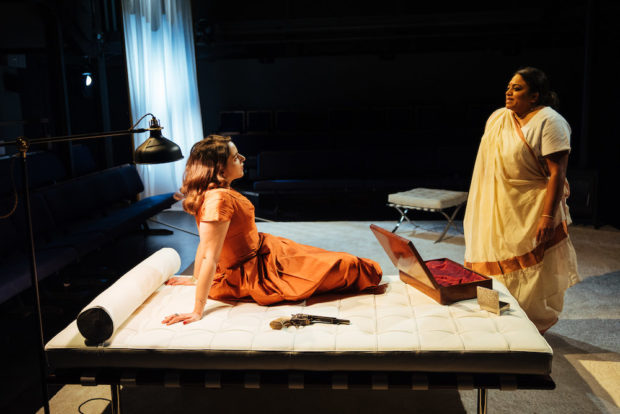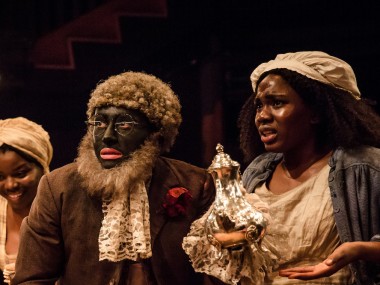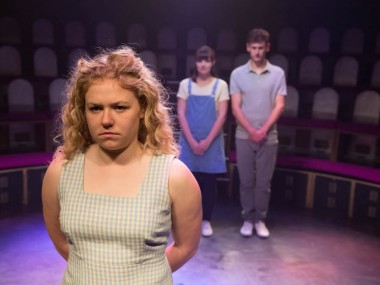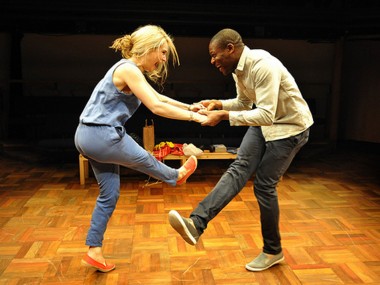Hedda, Orange Tree Theatre
Monday 27th October 2025

In 2023, Malaysian actor Michelle Yeoh won the Best Actress Oscar for her performance in Everything Everywhere All at Once. Some reactions praised her as “the first Asian actress” to achieve this nomination. In fact, the first Asian nominee in this category was Merle Oberon for the 1935 film The Dark Angel. Ironically enough, but understandably because of the Hays Code, which prohibited the depiction of interracial relationships (miscegenation), and the “one-drop rule” which classified anyone with any Black ancestry as Black, Oberon spent most of her career passing as white — despite her mixed Anglo-Indian heritage.
In Hedda, Tanika Gupta’s excellent new adaptation of Henrik Ibsen’s 1891 play Hedda Gabler, Oberon is the inspiration behind this thrilling reimagining of the tragedy, which relocates the action to a fashionable mews house in Chelsea, London, in 1948. India has become independent the previous year, and this Hedda, who was once a Hollywood star, is now the wife of rising British film director George Tesman. Returning from their honeymoon, the “exotic” Hedda has apparently retired from acting and wants to be herself, to acknowledge her Anglo-Indian heritage despite the racial prejudice all around her. In fact, her secret is so profound that even her name is not the one she had as a child.
As the daughter of a British army officer and an Indian woman, Hedda shares her past with Leonard, an erratic script writer who is a recovering alcoholic and has been attracted to her since childhood. Other visitors to their well-appointed house include George’s Aunt Julia, who hopes that Hedda is pregnant, Alice Smith, a young actor who seems to be in love with Leonard, and John Brack, a film producer who suggests that Hedda could make a comeback if she agreed to his proposition of a discretely polyamorous ménage à trois. When Leonard completes a script which reveals her Anglo-Indian heritage, Hedda becomes desperate — and precipitates a tragedy.
Like Ibsen’s original, Gupta’s version is tightly plotted and written with sensitivity not only to the story’s subtexts, but also to the reverberations of the new context that she has invented. In this reimagining, the first person onstage is Shona, Hedda’s former ayah and current personal maid, and their secrets are unsuspected by the naïve George and the racist Aunt Julia, who thinks that “black skin is more elastic”, but also makes a pointedly ambiguous remark about Hedda’s lovely brown eyes. The appalling injustice of colonial racism comes across in Leonard’s backstory: like many subject peoples, he has fought bravely for Britain during the second world war, only to find his true self despised. In this context, his alcoholism and Hedda’s manipulations are symptoms of those without power. Covert anger, but resistance nevertheless.
The central theme of Gupta’s play is the question of who controls whose story? Her Hedda is physically attractive, but openly cruel in her relationships with George, who she physically despises, and Julia, whose new hat she deliberately insults. Her attitude to Alice, who inspires jealousy in her, is that of a manipulator and bully (at one point she pulls her hair violently). But she is also a sympathetic woman who has found herself hemmed in by several men, including two previous husbands, and who needs to protect her comfortable lifestyle while struggling to make her genuine voice heard. Blackmailed by Brack, and realising that she is unable finally to control her own story leads her to the play’s denouement.
At one point, Shona says that “the mouth that speaks the truth earns many enemies”, and indeed Hedda’s life is built on several layers of deception. With Leonard she shares the secret of their racial origins and both have a well-founded fear of rejection. Gupta accurately illustrates the casual racism of British society in the 1940s with great clarity, a reminder that our culture is built on a colonial past, with its rather vile imperialist attitudes, which still consistently infects the present. Even up to now. The other truth that Hedda cannot face is a biological one: she really doesn’t want to have children, but it looks like she is already pregnant.
Hettie Macdonald’s well-focused production, on Simon Kenny’s elegant cream-coloured set, features a stand-out central performance by Pearl Chanda, who brings out Hedda’s unpleasant features as well as her attractive side. At various moments, she can be desperate in the histrionic self-dramatizing fashion of an actor, vulnerable like a little girl hiding a bad thing, or seductive as a grown woman who understands her own charm, and the lusts of men, only too well. Life has taught her to be hard, and controlled, but Chanda is also convincingly on edge. A woman coping with damage. She is aided by Rina Fatania’s Shona, a canny individual who knows more than she says — and very important in a play about secrets.
Of the rest of the cast, I like Joe Bannister’s tentative and bewildered George, so English and insular in his incomprehension of the wider world beyond his own camera angles, and by contrast Milo Twomey’s sleazy but highly capable Brack, an older man clearly on the prowl. Bebe Cave’s Alice radiates a fresh view of young womanhood, while Jake Mann’s Leonard plugs into the passions of youthful creativity and problematic alcohol abuse. Like Gupta’s previous Ibsen adaptation, A Doll’s House, which is set in Victorian Calcutta and has a Bengali Nora, this Hedda is a fresh and fascinating reinterpretation of a classic that gives room for its audiences to think about the issues of race, of identity and of the historical constraints on women. At the same time, it is full of comic lines which offer a welcome relief to the more troubling emotions being explored. And it has a nicely subversive ending! Bang, bang, pow!
This review first appeared on The Theatre Times




